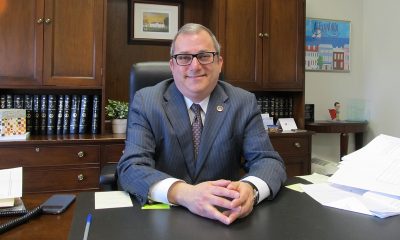District of Columbia
New appeal for help in solving 1987 D.C. gay murder case
U.S. Navy commander was fatally stabbed outside Chesapeake House gay bar
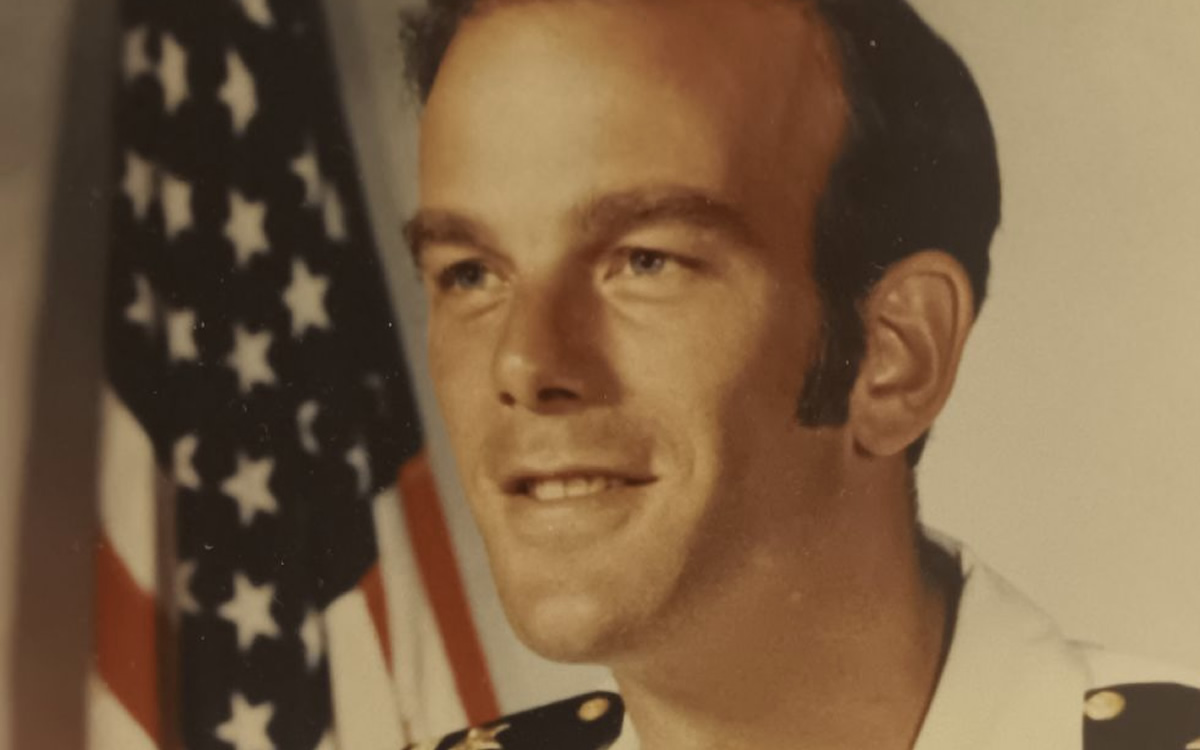
The family of a 43-year-old gay U.S. Navy commander who was stabbed to death shortly after midnight on Jan. 1, 1987, minutes after he left a D.C. gay bar in a yet unsolved case considered a hate crime, is appealing to the public for help in providing police with a tip that may lead to the identity of two male suspects.
D.C. police at the time of the murder said Commander Gregory Peirce, an Alexandria, Va., resident who served as a staff officer at the Pentagon, was approached by two men appearing to be in their early 20s as he and a man he was with left the Chesapeake House, a gay bar at 946 9th St., N.W. at about 12:15 a.m.
A Washington Blade story published on Jan. 9, 1987, reported that police sources familiar with the investigation said one of the male suspects stabbed Peirce in the chest and neck, then kicked him repeatedly while he lay unconscious at the site of the stabbing in a parking lot behind the Chesapeake House.
The second suspect chased the man who was with Peirce toward the entrance of the bar, slashing the back of the man’s coat with a knife as the man sought help from the Chesapeake House doorman, Tom Vaughn, police sources told the Blade.
A police spokesperson said Peirce was pronounced dead about 90 minutes later at George Washington University Hospital as a result of a severed neck artery, the Blade reported. The man he was with, who told police what he observed, was not injured.
Amanda Soderlund, Peirce’s niece, told the Blade she and her family remain hopeful that the two young men involved in the fatal stabbing 36 years ago could be brought to justice.
She said her beloved uncle, who did not openly identify as gay while serving in the Navy, was just a few months away from retiring and being honorably discharged from the Navy.
“My uncle was an incredible man,” Soderlund said in an Oct. 5 phone interview. “We have a very large family,” she said, and family members have long tried to find out exactly what happened and why when Gregory Peirce became D.C.’s first homicide victim of 1987.
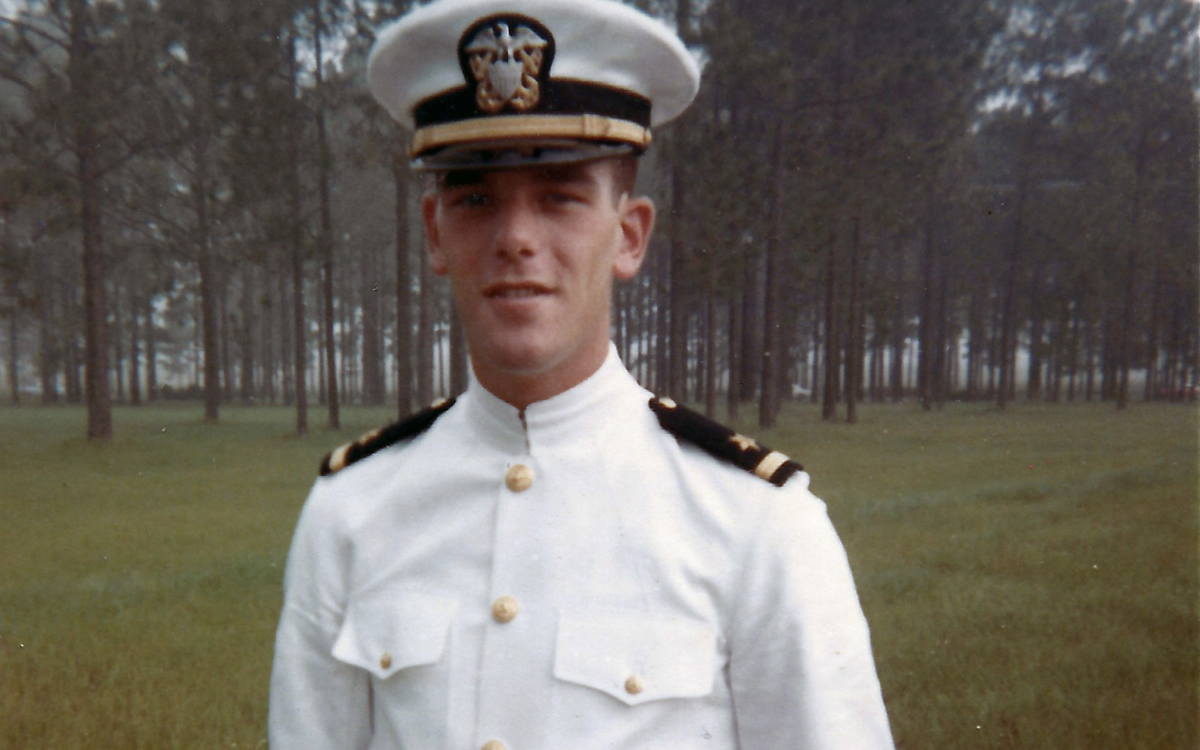
Longtime D.C. police homicide Detective Danny Whalen, who is assigned to the homicide unit’s Cold Case Squad, told the Blade last week that the Peirce murder case is among the large number of old homicide cases that cannot be solved unless new information surfaces.
“You know, we would love nothing more than to bring these people to justice,” Whalen said of the two unidentified suspects in the Peirce murder. “The detectives who worked the case at the time exhausted everything in their power,” said Whalen. “And if they could have made an arrest, they would have.”
Whalen noted that the two suspects, who witnesses said appeared to be in their 20s, would likely be in their late 50s or early 60s at this time, assuming they are still alive. Whalen and other law enforcement officials have said for investigators to make an arrest in an old case like this, one or more people who know something about the case and who may have known the two suspects need to come forward with information.
Soderlund, Peirce’s niece, said she has reached out to the Blade and may reach out to other news media outlets to draw attention to the case, with the hope that someone reading about it in the press might just come forward with a tip that could lead to an arrest.
“The Metropolitan Police Department currently offers a reward of up to $25,000 to anyone that provides information which leads to the arrest and conviction of the person or persons responsible for each homicide committed in the District of Columbia,” according to a D.C. police statement issued at the time police announce a new unsolved murder case.
The statement says anyone with information about a case should call police at 202-727-9099. It says anonymous information can be submitted to the department’s TEXT TIP LINE by sending a text message to 50411.
Although other news media outlets, including the Washington Post, initially reported that police said the motive for the attack against Peirce and his companion appeared to be a robbery gone bad, police sources and witnesses from the Chesapeake House told the Blade the incident appeared to be an anti-gay hate crime or gay bashing.
The man who was with Pierce told police the incident began when the two male suspects approached the two men as they left the Chesapeake House and one of them said, “Wonder if they have any money,” according to an account by the Washington Post.
But the man accompanying Peirce also told police the two attackers never specifically asked for or demanded money. Words were exchanged between the four men in the parking lot and a fight broke out, police sources said, which led to Peirce being stabbed.
At least two police sources said the man who stabbed Peirce had time to search for Pierce’s wallet while Pierce was lying unconscious in the parking lot, but the attacker did not do so.
Instead, the attacker began kicking Pierce repeatedly while he lay motionless and bleeding, one of the police sources told the Blade back in January 1987. “For all practical purposes [Pierce] was dead when this guy was kicking him,” the source said.
In its Jan. 9, 1987, story on the Peirce murder, the Blade reported that experts familiar with anti-gay violence, including police investigators, consider the action by one of the two suspects in the Peirce case who repeatedly kicked Peirce while he lay unconscious as a form of “over kill” often triggered by a deeply held hatred toward and fear of homosexuality.
Chesapeake House employee Michael Sellers told the Blade the week following the murder that a group of young males were yelling anti-gay names, such as “faggot” and “queer,” at several Chesapeake House patrons and another of the bar’s employees when the patrons and employee stood outside the bar about an hour before Peirce was stabbed.
One of the employees and two of the patrons told the Blade the males who were shouting at them appeared to match the descriptions of the two men who attacked Peirce and the man with Peirce. But homicide detective Whalen told the Blade last week that there is no definitive evidence that the young man who stabbed Peirce was among the group that shouted anti-gay names prior to the stabbing.
The Chesapeake House, which opened sometime in the 1970s and featured nude male dancers, closed in 1992 shortly before its building was demolished to make way for a new high rise office building.
In reviewing the information he is aware of about the case Det. Whalen said that while it appears to be a hate crime, the exact motive of the murder has yet to be confirmed.
“It’s one of those things where it was a street attack,” said Whalen. “Their intentions were never stated,” he said. “However, it was either a hate crime or a street robbery or a combination of both.”
LGBTQ activists at the time said they believed it was a hate crime. And they expressed concern and anger that the news media at the time, other than the Blade, did not report that the stabbing incident took place minutes after Peirce and the man he was with left a gay bar.
In a Jan. 2, 1987, story, one day after the murder took place, the Washington Post reported that Navy officials told Peirce’s brother that Peirce and a group of friends had come to D.C. that night to attend the city’s New Year’s celebration at the Old Post Office building at 12th and Pennsylvania Ave., N.W., which is located about a half mile away from the Chesapeake House.
Other news media accounts left the impression that the murder may have been related to assaults that had taken place among the large crowds of people who turned out for past New Year’s celebrations outside the Old Post Office building.
The Post article reported that police said the stabbing took place in the 900 block of H Street, N.W. and that Peirce and the man he was with had just left a bar that the article did not identify by name.
“The truth was being held back,” Chesapeake House employee Michael Sellers told the Blade.
Soderlund said she and other Peirce family members have speculated that officials with the Navy may have wanted to downplay or hide the fact that a Navy commander who worked at the Pentagon was gay and was attacked after leaving a gay bar.
At that time, under longstanding U.S. military policy, active-duty military members discovered to be gay, lesbian, or bisexual were almost always discharged from the service as potential security risks. The so called ‘Don’t Ask, Don’t Tell’ policy initiated by President Bill Clinton, which eased the anti-gay policy to a small degree, did not take effect until 1994.
Soderlund told the Blade she and her family members thought there was more to Peirce’s murder than a street robbery, but they had little information to go on until she contacted one of the two Washington Post reporters who wrote the Post’s initial story on the case. That reporter, John Ward Anderson, who has since retired, informed her about the Blade’s possible coverage of the story and suggested she contact the Blade.
Anderson told the Blade that the Post was not aware of information by police sources that the murder was a possible hate crime at the time the Post published its initial story on the case. He said the Post would have mentioned the possible anti-gay angle to the case had it known about it.
When Soderlund contacted the Blade, the Blade sent her a copy of the Blade’s Jan. 9, 1987, story, which Soderlund said provided information about the case that she and other family members were not aware of, including information that the murder was likely an anti-gay hate crime.
In yet another development in the ongoing saga of her uncle’s murder, Soderlund said she reached out to Det. Whalen, who gave her the name of the man who was with Peirce at the time of the murder and informed her that the man had died of natural causes in 1994 at the age of 58. In doing an online search, she found a May 1, 1997, Washington Post story about this man, Orrin W. Macleod, a U.S. Marine Corps veteran and member of the U.S. Merchant Marines before becoming a ground crew employee at Washington National Airport.
“He never reached out to our family,” Soderlund said. “We never heard from him,” she said, adding that she has long assumed, like her uncle, Macleod was not out as gay and most likely did not want to speak out publicly about the Peirce murder.
But the Post article about him said he became a hero of sorts in Fairfax County shortly before he died of leukemia when he donated most of his life savings and inherited wealth of $1 million to the Fairfax County Public Library.
“The money, at Macleod’s request, will be invested in books on tape, which he used near the end of his life when his vision was impaired,” the Post article states.
Soderlund said it’s her understanding that Fairfax Public Library officials were unaware that the generous donation they received was from a gay man who survived a violent attack that took the life of her uncle.
Shortly after the murder, D.C. police spokesperson Quintin Peterson described one of the men involved in the Peirce murder as being Black, with dark-complected skin, about 5-feet-9 inches tall, slender, with a mustache and wearing dark glasses, a blue knit hat, a dark blue jacket, and dark pants.
Peterson described the second man involved in the murder as being Black with a medium complexion, about 5-feet-9 inches tall, with hair on his chin, and wearing a green coat, a light-colored knit hat, and dark pants.
Police sources said witnesses told police the two attackers calmly walked away from the scene of the crime along H Street, with their whereabouts unknown.
In keeping with longstanding D.C. police policy, a reward of up to $25,000 is offered to anyone providing information leading to an arrest and conviction of persons responsible for a homicide committed in D.C.
Anyone with information should contact police at 202-727-9099 or submit an anonymous tip to the department’s TEXT TIP LINE by sending a text message to 50411.
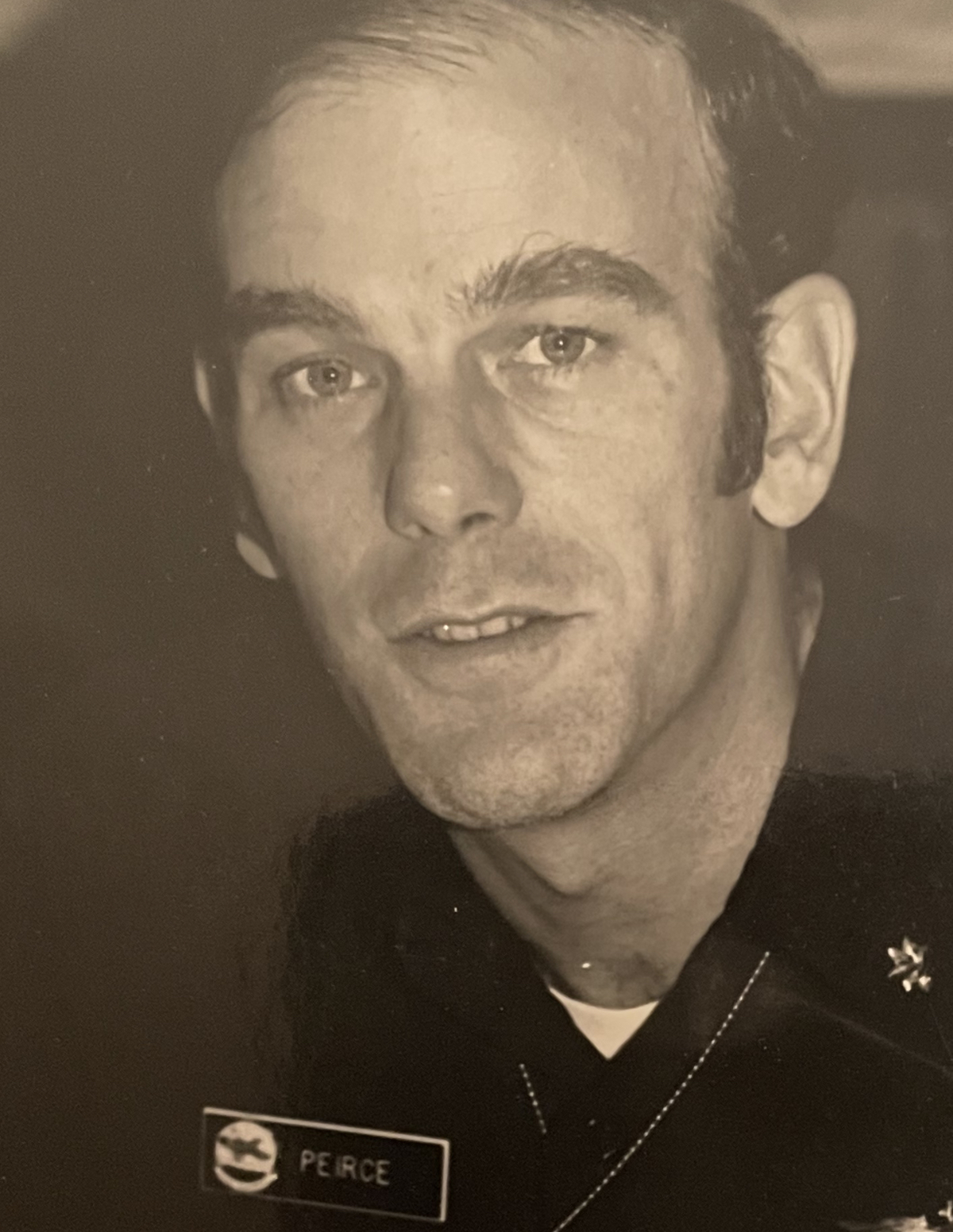
District of Columbia
Kennedy Center renaming triggers backlash
Artists who cancel shows threatened; calls for funding boycott grow

Efforts to rename the Kennedy Center to add President Trump’s name to the D.C. arts institution continue to spark backlash.
A new petition from Qommittee , a national network of drag artists and allies led by survivors of hate crimes, calls on Kennedy Center donors to suspend funding to the center until “artistic independence is restored, and to redirect support to banned or censored artists.”
“While Trump won’t back down, the donors who contribute nearly $100 million annually to the Kennedy Center can afford to take a stand,” the petition reads. “Money talks. When donors fund censorship, they don’t just harm one institution – they tell marginalized communities their stories don’t deserve to be told.”
The petition can be found here.
Meanwhile, a decision by several prominent musicians and jazz performers to cancel their shows at the recently renamed Trump-Kennedy Center in D.C. planned for Christmas Eve and New Year’s Eve has drawn the ire of the Center’s president, Richard Grenell.
Grenell, a gay supporter of President Donald Trump who served as U.S. ambassador to Germany during Trump’s first term as president, was named Kennedy Center president last year by its board of directors that had been appointed by Trump.
Last month the board voted to change the official name of the center from the John F. Kennedy Memorial Center For The Performing Arts to the Donald J. Trump And The John F. Kennedy Memorial Center For The Performing Arts. The revised name has been installed on the outside wall of the center’s building but is not official because any name change would require congressional action.
According to a report by the New York Times, Grenell informed jazz musician Chuck Redd, who cancelled a 2025 Christmas Eve concert that he has hosted at the Kennedy Center for nearly 20 years in response to the name change, that Grenell planned to arrange for the center to file a lawsuit against him for the cancellation.
“Your decision to withdraw at the last moment — explicitly in response to the Center’s recent renaming, which honors President Trump’s extraordinary efforts to save this national treasure — is classic intolerance and very costly to a non-profit arts institution,” the Times quoted Grenell as saying in a letter to Redd.
“This is your official notice that we will seek $1 million in damages from you for this political stunt,” the Times quoted Grenell’s letter as saying.
A spokesperson for the Trump-Kennedy Center did not immediately respond to an inquiry from the Washington Blade asking if the center still planned to file that lawsuit and whether it planned to file suits against some of the other musicians who recently cancelled their performances following the name change.
In a follow-up story published on Dec. 29, the New York Times reported that a prominent jazz ensemble and a New York dance company had canceled performances scheduled to take place on New Year’s Eve at the Kennedy Center.
The Times reported the jazz ensemble called The Cookers did not give a reason for the cancellation in a statement it released, but its drummer, Billy Hart, told the Times the center’s name change “evidently” played a role in the decision to cancel the performance.
Grenell released a statement on Dec. 29 calling these and other performers who cancelled their shows “far left political activists” who he said had been booked by the Kennedy Center’s previous leadership.
“Boycotting the arts to show you support the arts is a form of derangement syndrome,” the Times quoted him as saying in his statement.
District of Columbia
New interim D.C. police chief played lead role in security for WorldPride
Capital Pride says Jeffery Carroll had ‘good working relationship’ with organizers
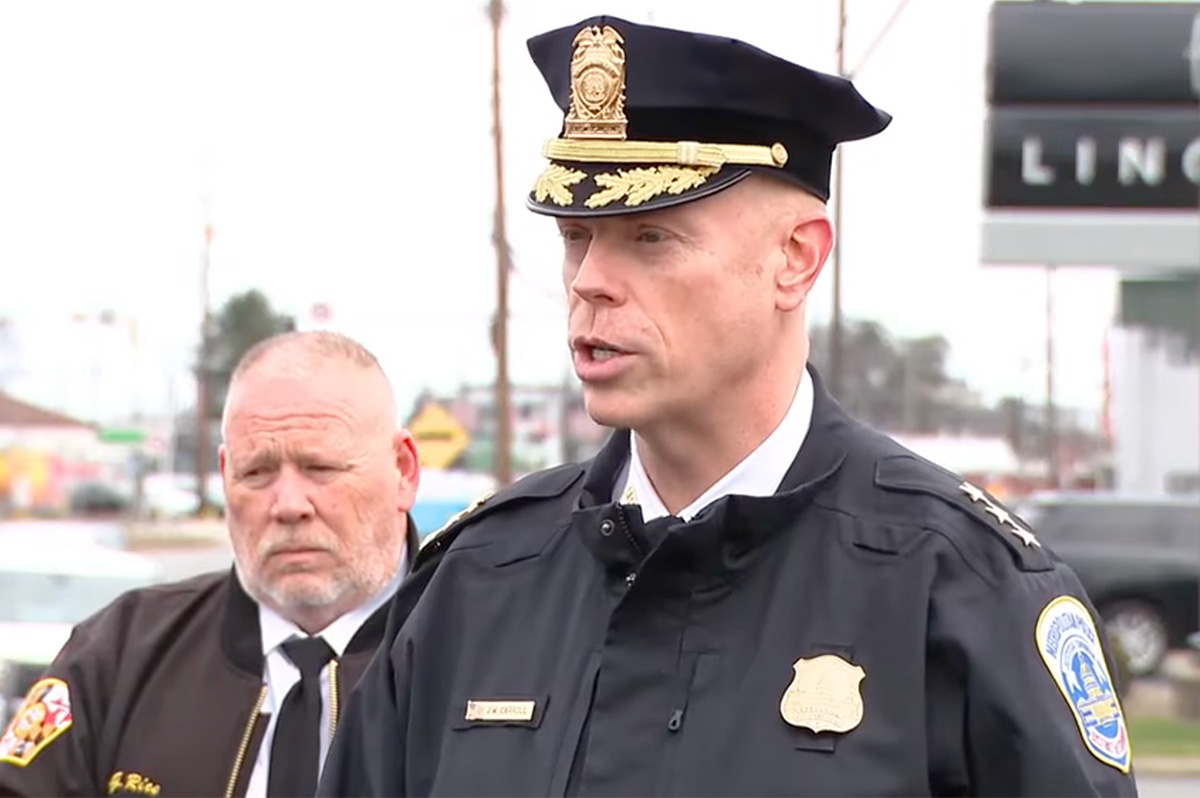
Jeffery Carroll, who was named by D.C. Mayor Muriel Bowser on Dec. 17 as the city’s Interim Chief of Police, played a lead role in working with local LGBTQ community leaders in addressing public safety issues related to WorldPride 2025, which took place in D.C. last May and June
“We had a good working relationship with him, and he did his job in relation to how best the events would go around safety and security,” said Ryan Bos, executive director of Capital Pride Alliance.
Bos said Carroll has met with Capital Pride officials in past years to address security issues related to the city’s annual Capital Pride parade and festival and has been supportive of those events.
At the time Bowser named him Interim Chief, Carroll had been serving since 2023 as Executive Assistant Chief of Specialized Operations, overseeing the day-to-day operation of four of the department’s bureaus. He first joined the D.C. Metropolitan Police Department in 2002 and advanced to multiple leadership positions across various divisions and bureaus, according to a statement released by the mayor’s office.
“I know Chief Carroll is the right person to build on the momentum of the past two years so that we can continue driving down crime across the city,” Bowser said in a statement released on the day she announced his appointment as Interim Chief.
“He has led through some of our city’s most significant public safety challenges of the past decade, he is familiar with D.C. residents and well respected and trusted by members of the Metropolitan Police Department as well as our federal and regional public safety partners,” Bowser said.
“We have the best police department in the nation, and I am confident that Chief Carroll will meet this moment for the department and the city,” Bowser added.
But Bowser has so far declined to say if she plans to nominate Carroll to become the permanent police chief, which requires the approval of the D.C. City Council. Bowser, who announced she is not running for re-election, will remain in office as mayor until January 2027.
Carroll is replacing outgoing Chief Pamela Smith, who announced she was resigning after two years of service as chief to spend more time with her family. She has been credited with overseeing the department at a time when violent crime and homicides declined to an eight-year low.
She has also expressed support for the LGBTQ community and joined LGBTQ officers in marching in the WorldPride parade last year.
But Smith has also come under criticism by members of Congress, who have accused the department of manipulating crime data allegedly showing lower reported crime numbers than actually occurred. The allegations came from the Republican-controlled U.S. House Oversight Committee and the U.S. Justice Department
Bowser has questioned the accuracy of the allegations and said she has asked the city’s Inspector General to look into the allegations.
Meanwhile, a spokesperson for the D.C. police Office of Public Affairs did not immediately respond to a question from the Washington Blade about the status of the department’s LGBT Liaison Unit. Sources familiar with the department have said a decline in the number of officers currently working at the department, said to be at a 50-year low, has resulted in a decline in the number of officers assigned to all of the liaison units, including the LGBT unit.
Among other things, the LGBT Liaison Unit has played a role in helping to investigate hate crimes targeting the LGBTQ community. As of early Wednesday an MPD spokesperson did not respond to a question by the Blade asking how many officers are currently assigned to the LGBT Liaison Unit.
District of Columbia
Imperial Court of Washington drag group has ‘dissolved’
Board president cites declining support since pandemic
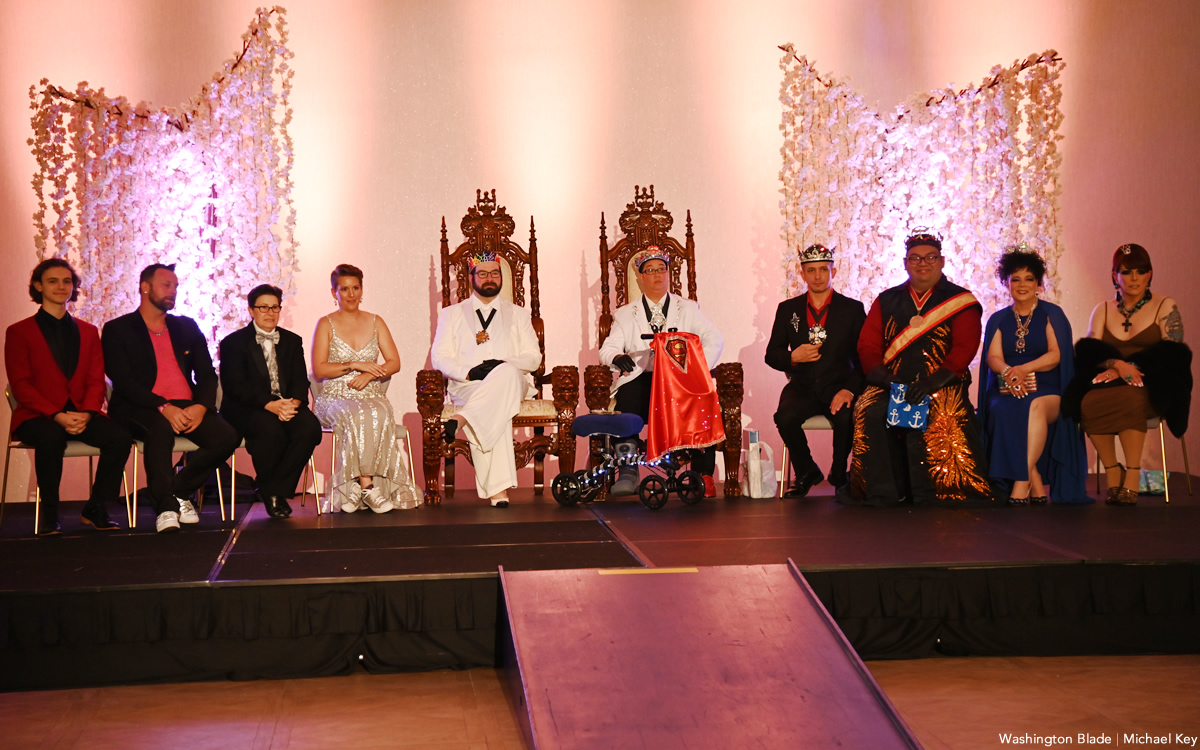
The Imperial Court of Washington, a D.C.-based organization of drag performers that has raised at least $250,000 or more for local LGBTQ and non-LGBTQ charitable groups since its founding in 2010, announced on Jan. 5 that it has ended its operations by dissolving its corporate status.
In a Jan. 5 statement posted on Facebook, Robert Amos, president of the group’s board of directors, said the board voted that day to formally dissolve the organization in accordance with its bylaws.
“This decision was made after careful consideration and was based on several factors, including ongoing challenges in adhering to the bylaws, maintaining compliance with 501(c)(3) requirements, continued lack of member interest and attendance, and a lack of community involvement and support as well,” Amos said in his statement.
He told the Washington Blade in a Jan. 6 telephone interview that the group was no longer in compliance with its bylaws, which require at least six board members, when the number of board members declined to just four. He noted that the lack of compliance with its bylaws also violated the requirements of its IRS status as a nonprofit, tax-exempt 501(c) (3) organization.
According to Amos, the inability to recruit additional board members came at a time when the organization was continuing to encounter a sharp drop in support from the community since the start of the COVID pandemic around 2020 and 2021.
Amos and longtime Imperial Court of Washington member and organizer Richard Legg, who uses the drag name Destiny B. Childs, said in the years since its founding, the group’s drag show fundraising events have often been attended by 150 or more people. They said the events have been held in LGBTQ bars, including Freddie’s Beach Bar in Arlington, as well as in other venues such as theaters and ballrooms.
Among the organizations receiving financial support from Imperial Court of Washington have been SMYAL, PFLAG, Whitman-Walker Health’s Walk to End HIV, Capital Pride Alliance, the DC LGBT Community Center, and the LGBTQ Fallen Heroes Fund. Other groups receiving support included Pets with Disabilities, the Epilepsy Foundation of Washington, and Grandma’s House.
The Imperial Court of Washington’s website, which was still online as of Jan. 6, says the D.C. group has been a proud member of the International Court System, which was founded in San Francisco in 1965 as a drag performance organization that evolved into a charitable fundraising operation with dozens of affiliated “Imperial Court” groups like the one in D.C.
Amos, who uses the drag name Veronica Blake, said he has heard that Imperial Court groups in other cities including Richmond and New York City, have experienced similar drops in support and attendance in the past year or two. He said the D.C. group’s events in the latter part of 2025 attracted 12 or fewer people, a development that has prevented it from sustaining its operations financially.
He said the membership, which helped support it financially through membership dues, has declined in recent years from close to 100 to its current membership of 21.
“There’s a lot of good we have done for the groups we supported, for the charities, and the gay community here,” Amos said. “It is just sad that we’ve had to do this, mainly because of the lack of interest and everything going on in the world and the national scene.”
-

 District of Columbia4 days ago
District of Columbia4 days agoTwo pioneering gay journalists to speak at Thursday event
-

 National3 days ago
National3 days agoWhat to watch for in 2026: midterms, Supreme Court, and more
-

 Colombia4 days ago
Colombia4 days agoBlade travels to Colombia after U.S. forces seize Maduro in Venezuela
-

 a&e features4 days ago
a&e features4 days agoQueer highlights of the 2026 Critics Choice Awards: Aunt Gladys, that ‘Heated Rivalry’ shoutout and more



